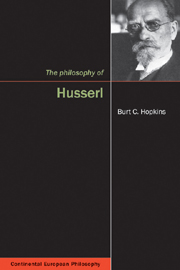Book contents
- Frontmatter
- Contents
- Acknowledgements
- Abbreviations
- Prolegomenon: Husserl's turn to history and pure phenomenology
- I Plato's and Aristotle's theory of eidē
- 1 Plato's Socratic theory of eidē : the first pillar of the ancient precedent to pure phenomenology
- 2 Plato's arithmological theory of eidē : the second pillar of the ancient precedent to pure phenomenology
- 3 Aristotle's criticism of Plato's theory of eidē : the third (and final) pillar of the ancient precedent to pure phenomenology
- II From descriptive psychology to transcendentally pure phenomenology
- III From the phenomenology of transcendental consciousness to that of monadological intersubjectivity
- IV From monadological intersubjectivity to the historical a priori constitutive of all meaning
- V The unwarranted historical presuppositions guiding the fundamental ontological and deconstructive criticisms of transcendental philosophy
- Epilogue: Transcendental-phenomenological criticism of the criticism of phenomenological cognition
- Coda: Phenomenological self-responsibility and the singularity of transcendental philosophy
- Notes
- Bibliography
- Index
3 - Aristotle's criticism of Plato's theory of eidē : the third (and final) pillar of the ancient precedent to pure phenomenology
from I - Plato's and Aristotle's theory of eidē
- Frontmatter
- Contents
- Acknowledgements
- Abbreviations
- Prolegomenon: Husserl's turn to history and pure phenomenology
- I Plato's and Aristotle's theory of eidē
- 1 Plato's Socratic theory of eidē : the first pillar of the ancient precedent to pure phenomenology
- 2 Plato's arithmological theory of eidē : the second pillar of the ancient precedent to pure phenomenology
- 3 Aristotle's criticism of Plato's theory of eidē : the third (and final) pillar of the ancient precedent to pure phenomenology
- II From descriptive psychology to transcendentally pure phenomenology
- III From the phenomenology of transcendental consciousness to that of monadological intersubjectivity
- IV From monadological intersubjectivity to the historical a priori constitutive of all meaning
- V The unwarranted historical presuppositions guiding the fundamental ontological and deconstructive criticisms of transcendental philosophy
- Epilogue: Transcendental-phenomenological criticism of the criticism of phenomenological cognition
- Coda: Phenomenological self-responsibility and the singularity of transcendental philosophy
- Notes
- Bibliography
- Index
Summary
Aristotle's dispute with Plato over the manner of being proper to the eidē
Aristotle's dispute with the Platonic account of the eidē takes issue with its “separation” of the “beinghood” (ousia) belonging to a genos from the multitude of single things that are encompassed by it. For Aristotle, the answer to the question “Why do things look the same?” is not because there is an eidos of a highest rank, the genos, that encompasses everything that is, but because each one of the things that are is generated in some material (hulē) by an eidos whose proper mode of being is “being-at-work (energeia)” on it. The “beinghood” of things caused by the perpetual “being-at-work” of the eidos (without it ever undergoing change) is perceived and understood by the soul because the very “being-at-work” of an eidos responsible for generation also shapes the soul's perception and informs its understanding. The “beinghood” or, more properly within the context of Aristotle's metaphysics, “thinghood”, of things has its source in “nature” (phusis). Because of this, thinghood, together with eidos, hulē and phusis, are one in the generation (genesis) that perpetuates life (zōē) forever. The perpetuation of life through generation is therefore directed by the unchanging eidos whose manner of being is responsible at once for the generated thinghood of that which is and for the generations of generated things being informed by their eidē.
- Type
- Chapter
- Information
- The Philosophy of Husserl , pp. 60 - 82Publisher: Acumen PublishingPrint publication year: 2010



